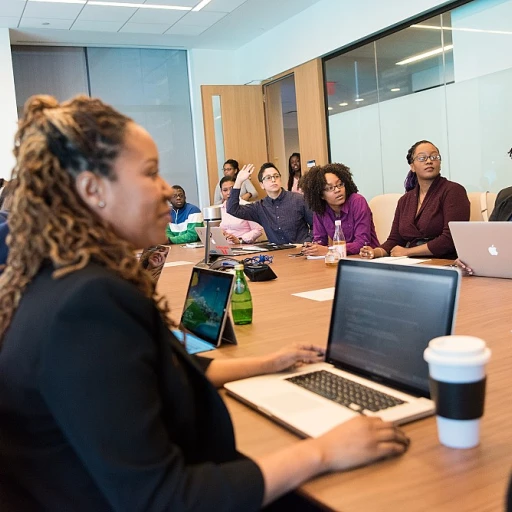
Understanding the Role of a Change Management Consultant
Exploring the Essence of the Change Management Consultant Role
The role of a change management consultant is instrumental in the realm of business transformation. These professionals are pivotal in guiding organizations through the complexities of change. Whether it's a technology overhaul, cultural transformation, or restructuring initiative, change management consultants provide the expertise necessary to navigate these challenges successfully. In a fast-paced business environment characterized by constant evolution, the need for effective change management becomes paramount. Change management consultants are tasked with helping organizations manage the human side of change, ensuring that employees are not only prepared for the transition but also equipped to thrive in the new setup. This is crucial because failed change efforts often trace back to inadequate attention to the people aspect of change. Change management consulting transcends mere project delivery; it involves deep engagements with company leaders to strategize and execute transformation initiatives. Management consultants employ best practices, methodologies, and tools to facilitate successful change implementation. This all-encompassing role requires one to be highly adaptable and able to tailor approaches to specific organizational needs. It is common for a change management consultant to collaborate with various stakeholders within a company. This collaboration may include HR teams, management consultants from other disciplines, and consultants from different sectors of the consulting firm. Such collaborations are essential for creating a cohesive strategy that meets organizational goals. To delve deeper into the intricacies of mastering change management, especially useful for those aspiring to excel as chief human resources officers, it's beneficial to explore mastering change management with Prosci, which offers guidance on shaping successful change initiatives within organizations. Understanding the essence of this role also involves recognizing the influence of organizational culture, the support of successful change efforts, and the optimization of digital adoption. The capacity to foster a transformative culture is a hallmark of consultants who excel in this dynamic and critical field.Key Skills for Success
Essential Abilities for Thriving as a Change Management Consultant
Operating effectively as a change management consultant requires a broad spectrum of skills committed to driving successful organizational transformation. Here are some pivotal capabilities that can aid consultants in making a substantial impact:
- Strategy Development: Crafting comprehensive change management strategies is key. This involves assessing a company’s organizational change readiness and aligning change initiatives with business objectives.
- Communication: Effective communication is integral to fostering understanding and engagement among all stakeholders. A consultant must clearly articulate the benefits of change and provide consistent updates throughout the change process.
- Problem-Solving: Navigating unforeseen challenges is common in change projects. A consultant’s ability to think critically and offer viable solutions is invaluable for keeping consulting projects on track.
- Interpersonal Skills: Building trusting relationships with management teams and staff members ensures support and cooperation during business transformation efforts and promotion of a culture change.
- Technical Knowledge: In today's digital age, familiarity with technology and digital adoption is crucial. Understanding how to leverage technological advancements can optimize change procedures.
- Project Management: Overseeing change initiatives necessitates sound project management skills. This includes coordinating tasks, timelines, and resources efficiently to achieve successful change outcomes.
- Training and Support: Providing the necessary training and ongoing support guarantees that organizational members can seamlessly adapt to new processes and systems.
By cultivating these skills, change management consultants position themselves for success in consultant jobs that demand specialized experience and an ability to support organizations in their strategic transformations. Emphasizing best practices in management consulting helps reinforce effective change and lasting improvements.
Challenges Faced by Change Management Consultants
Navigating the Complex Landscape of Consulting Challenges
In the role of a change management consultant, grappling with multifaceted challenges is par for the course. Whether embarking on a new project or ensuring seamless organizational change, consultants encounter hurdles that require skillful navigation and strategic thinking. Among the predominant challenges is the resistance to change, which is a natural human response when faced with transformation. This resistance often stems from ingrained organizational culture and the fear of the unknown. To effectively help businesses, consultants must tailor strategies that align with both the organizational change objectives and the underlying culture. Fostering communication and investing in training initiatives can support a culture change that is more accommodating to transformation. Additionally, the intricate complexity of systems and processes within companies often presents a significant obstacle. Consultants must possess a strong understanding of technology to address these systems, facilitating a transition that doesn’t disrupt business operations. Being adept at digital adoption and integration ensures the successful implementation of new technologies in the workplace. Time constraints pose another challenge in the fast-paced world of management consulting. Projects often come with tight deadlines and budgetary limitations, requiring consultants to swiftly tailor solutions and keep transformations on schedule without compromising the quality of outcomes. Moreover, the ever-evolving nature of the consulting landscape means staying informed about the latest best practices and industry trends is essential for management consultants. This involves ongoing learning and skill development to maintain relevance and effectiveness in their consultant jobs. Effective change management requires an equilibrium between strategic foresight and tactical execution. Understanding the difference between strategy and tactics in managing these aspects is crucial to ensure a seamless transformation process. For more insights into these strategic approaches, explore understanding the difference between strategy and tactics in HR leadership. Despite these challenges, possessing a robust foundation of experience, strategic agility, and an empathetic approach to guiding people through change can make the difference between a successful change initiative and one that falls short.Career Pathways and Opportunities
Navigating the Professional Trajectory
In the realm of organizational change, determining the right career pathway can be challenging yet rewarding. For those aiming to become a change management consultant, the journey involves a series of opportunities that converge from various fields, such as human resources, management consulting, and even technology.- Start with an Educational Foundation: While there is no single prescribed educational path, a degree in business administration, psychology, or human resources can lay the groundwork. Furthermore, pursuing specialized courses or certifications in change management can enhance your credentials in the field.
- Gain Industry Experience: Practical experience is crucial. Engaging in roles that allow you to participate in or lead change initiatives provides valuable insights into the nature of organizational transformation. Companies often seek candidates with a solid track record of managing successful change projects.
- Leverage Diverse Opportunities: Various roles across industries can serve as stepping stones. Whether you start in human resources, IT, or project management, each offers unique perspectives and skills that contribute to effective change management. Interdisciplinary experience is highly valued and supports broader consulting services.
- Seek Mentorship and Networking: Building relationships with experienced change consultants and joining professional networks can provide guidance and open doors to job opportunities. Learning from seasoned professionals can enhance your understanding of best practices and industry standards.
- Explore Consulting Firms: Many management consultants begin their careers in established consulting firms. These environments offer exposure to diverse change projects and culture changes, allowing you to develop a well-rounded skill set. Additionally, consulting firms often provide training and support to help their consultants succeed.
- Adopt a Continuous Learning Approach: The change management landscape is constantly evolving, with new methodologies and technologies emerging. Staying current by attending workshops, reading industry publications, and participating in relevant training can keep you at the forefront of successful change strategies.
The Intersection of Change Management and Human Resources
The Fusion of Change Management and HR: A Dynamic Intersection
The evolving landscape of business often finds the roles of change management and human resources (HR) playing crucial intersecting parts. This union not only enriches the collective impact on organizations but also broadens the scope of both fields. Here’s how change management consultants and HR professionals collaborate to foster effective change within organizations:- Shared Goals of Transformation: At the heart of both disciplines lies the aim to facilitate organizational change. HR professionals focus on the people aspect of change, preparing the workforce for transformation, while change management consultants drive the process, ensuring seamless, strategic shifts in business operations.
- Culture Change and People Dynamics: A successful change initiative heavily relies on understanding and adapting organizational culture. HR’s expertise in gauging employee attitudes and behaviors complements the change consultant’s role in crafting strategies to manage these dynamics effectively.
- Training and Development Initiatives: HR’s role in designing and implementing training programs is pivotal. By equipping employees with the skills needed for transformation, HR sets the stage for a smoother change journey. Change management consultants collaborate by integrating these training elements into broader change programs, ensuring alignment with organizational goals.
- Strategic Support and Guidance: In projects that demand a high level of organization-wide engagement, HR and change management teams are tasked to provide holistic support and guidance. This collaboration ensures that the changes are not only implemented but also embraced, supported, and sustained.
- Harnessing Technology for Organizational Change: Both fields recognize the potential of technology in accelerating transformation. While HR may focus on digital tools to improve internal HR processes, change management consultants emphasize the use of technology for broader organizational change, including digital adoption strategies.













